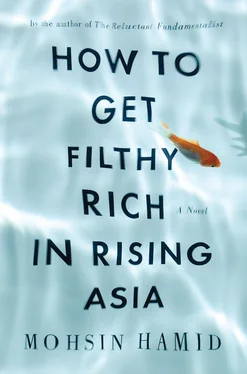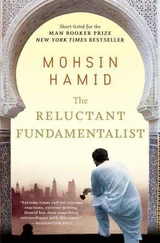You are fortunate that your second heart attack takes place in the ICU. When you regain consciousness, you have become a kind of cyborg, part man, part machine. Electrodes connect your chest to a beeping computer terminal mounted on a rack, and a pair of transparent tubes channel oxygen from a nearby metal tank to your nostrils and fluids from a plastic pouch into your bloodstream through a needle taped at your wrist. You panic and start to flail, but your limbs barely move and you are gently restrained. A nurse speaks. You have difficulty following her words. You understand, though, that for the moment this apparatus and you are inseparable.
To be a man whose life requires being plugged into machines, multiple machines, in your case interfaces electrical, gaseous, and liquid, is to experience the shock of an unseen network suddenly made physical, as a fly experiences a cobweb. The inanimate strands that cling to your precariously still-animate form themselves connect to other strands, to the hospital’s power system, its backup generator, its information technology infrastructure, the unit that produces oxygen, the people who refill and circulate the tanks, the department that replenishes medications, the trucks that deliver them, the factories at which they are manufactured, the mines where requisite raw materials emerge, and on and on, from your body, into your room, across the building, and out the doors to the world beyond, mirroring in stark exterior reality preexisting and mercifully unconsidered systems within, the veins and nerves and sinews and lymph nodes without which there is no you. It is good you sleep.
When you next wake, your nephews are here, your brother’s sons, and also, surprisingly, your ex-wife, along with her new husband, a bearded man with a fatherly demeanor that disorients you because he is practically a generation your junior. The illumination of your room is odd, futuristic, the artifact of either some advanced bulb technology or your addled mental state. Your doctor pats your hand and summarizes for you, in everyone’s presence, your overall position and course of treatment. Your prognosis is less than peachy. The muscles of your heart have been damaged and the fraction of blood it is pumping per beat is dangerously low. Such a condition need not be immediately fatal, your doctor has himself had a patient who improved and lived on for years after a similar level of impairment. But you also have extensive blockages of the coronary arteries and so you face the imminent likelihood of a further heart attack, which would almost certainly be terminal. Yet in your situation a bypass or angioplasty is out of the question, and leaving the hospital, in your doctor’s judgment, would also be unwise. It would be best to wait and see.
You understand this advice as a coded instruction to prepare to die, a thought reinforced by the wet film you observe dancing in the eyes of your ex-wife. She returns to the hospital each day, usually minus her husband. She is formal with you but also efficient, as though playing the role of a dedicated administrator in a movie. Under her supervision, second and third opinions are sought, a new cardiologist identified, and you moved to a different institution. A renowned world expert has agreed to see you in a few weeks, when he is next in your city, and it is on him that your ex-wife appears to pin her hopes.
This world expert is like a man from another planet, with an orange glow to his skin, unnaturally white teeth, and hair so thick he could safely ride a motorcycle without a helmet. Upon examining you and considering your file, he says there is no reason that a few stents in your arteries should not do the trick. There is, of course, a modest chance of dying on the operating table, but since there is a very good chance of dying soon off of it, the risk seems outweighed by the potential reward.
You agree to the procedure. It is performed while you are awake, disconcertedly watching on a monitor the camera feed from a robotic probe inside your body as tiny mechanical contraptions unspool and expand within you, forcing the flabby walls of your arteries open and locking them in place. You wonder whether, should anything go wrong, you will see your death depicted in the micro-battlefield on-screen before your brain ceases to function, or whether the internal chain of events will outpace the external relay, leaving you with simple blackness, despite everything this spaceship of an operating theater has to offer. The question remains theoretical, however, for the world expert declares your surgery an unmitigated success.
The following day, after your post-op checkup, he tells you that if, now resupplied with blood, your heart recovers as much as, despite your advanced age, he thinks it might, you are looking at many months, or even a few years, of unhospitalized life. You thank him. You also thank your ex-wife. It is in this moment, glancing at the world expert and receiving a solemn, orange-hued nod, and asking you to relax and try to take the news without allowing yourself to get too agitated, she informs you that her brother, whom she now wishes had never been born, has absconded abroad with the funds your company raised for its planned acquisition, unable perhaps to resist the opportunity presented by your absence, and further that your company is consequently bankrupt, as are you, and that the policemen stationed outside your room are not there for your protection, as you have heretofore assumed, but rather because you are technically under arrest.
You take this news as well as possible, which is to say you do not die. You tell your ex-wife you have no doubt she had nothing to do with it, the error in hiring and trusting her brother being entirely yours, and you point out that, health-wise, you are feeling much better than you have in weeks. You do not mention that the earth’s gravity and atmospheric pressure seem to have increased since your heart attacks, or that walking unassisted to the bathroom this morning was like circumnavigating the surface of an alien and inhospitable moon.
When she leaves, you sit in silence for an entire day. Then you get to work. Your nephews access pockets of funds you have secreted away, which, because hidden, your creditors have not seized, and so you are able to hire a criminal lawyer, pay the necessary bribes, secure bail, and rent a room in a two-star hotel, all without needing to burden further your less-than-wealthy ex-wife. She refuses, though, while hanging her handsome, covered head, to allow you to reimburse her for the sizable costs of your medical treatment. It was the least she could do, she says.
As you now lack a driver or a car of your own, your nephews drive you to the hotel, railing against your deputy, whom they suspected was rotten ever since he eased them out of your firm years ago, adding quickly that they harbor no ill will towards you, you are their uncle, and blood is stronger than such disappointments. They ask you to move in with them. You express gratitude but say you are more used to being alone. Through the windscreen you see dust and pollution suspended over the city like a dome, transforming the sky to copper and the clouds to irradiated bronze.
In the months that follow, you receive anonymous death threats and meet with politicians you thought were allies but prove barely able to conceal their gloating. You are caught up in one of the cynical accountability campaigns periodically launched by your city’s establishment, tossed to the wolf pack of public opinion, unsubstantiated rumors of your shady dealings receiving scandalized attention in newspapers. You have always been an outsider, and finally you have been wounded. It is only natural that you be sacrificed so that the rest of the herd may prance on.
Once this outcome is clear, you accept your fate without too much resistance, struggling, to the extent you do, largely out of habit and a sense of responsibility for your ex-employees. It almost seems that a part of you perversely welcomes being humbled in this way, that you suffer from some mad impulse to slough off your wealth, like an animal molting in the autumn. Perhaps this contributes to the frenzy with which you are attacked. When it is over, your financial bones retain only tiny slivers of their former meat, but you have not been picked entirely clean. You are not destitute. You remain unincarcerated. You are an old man in a hotel room, taking your medication, looking out the dirty window at the street below, traveling by taxi when you must.
Читать дальше












